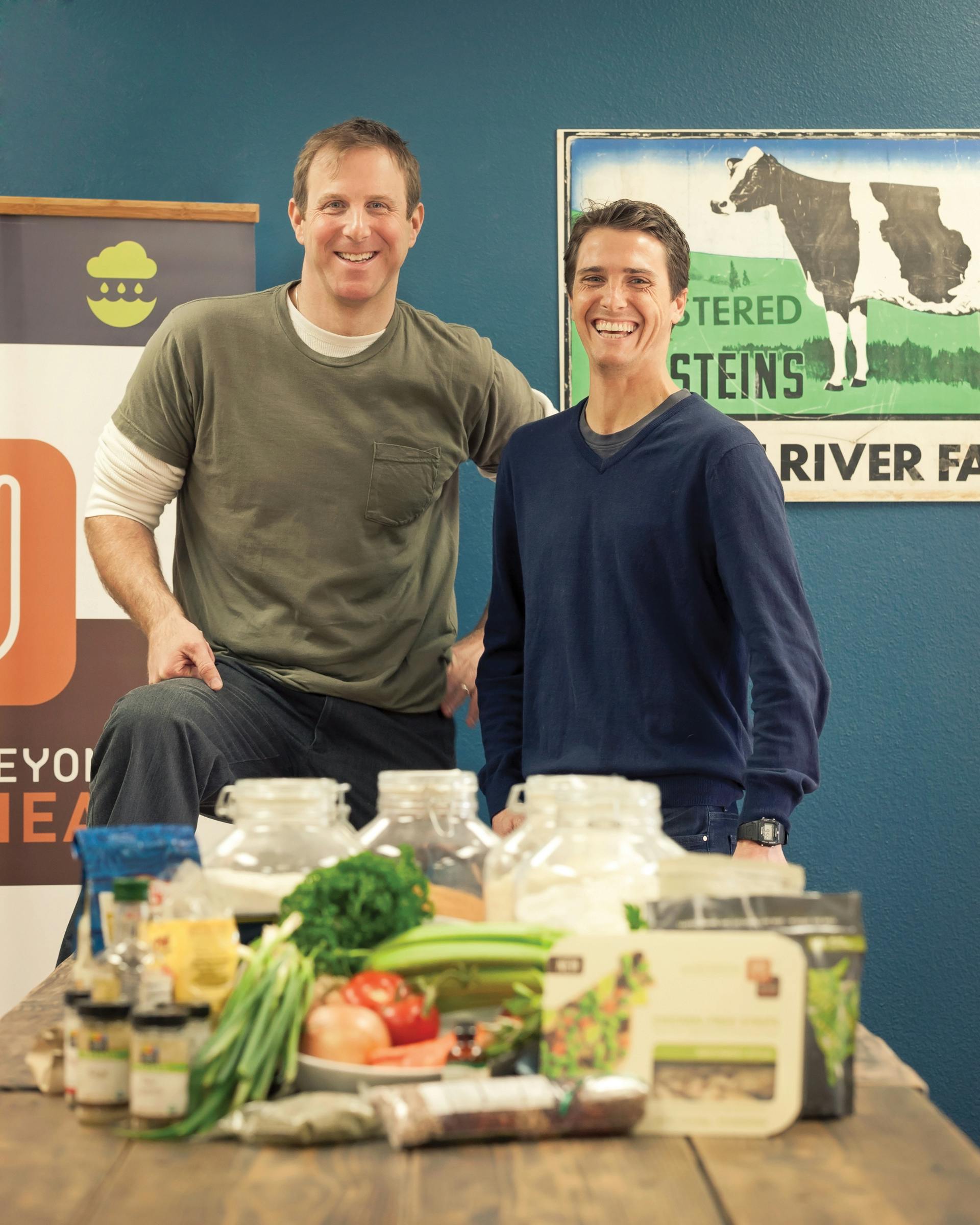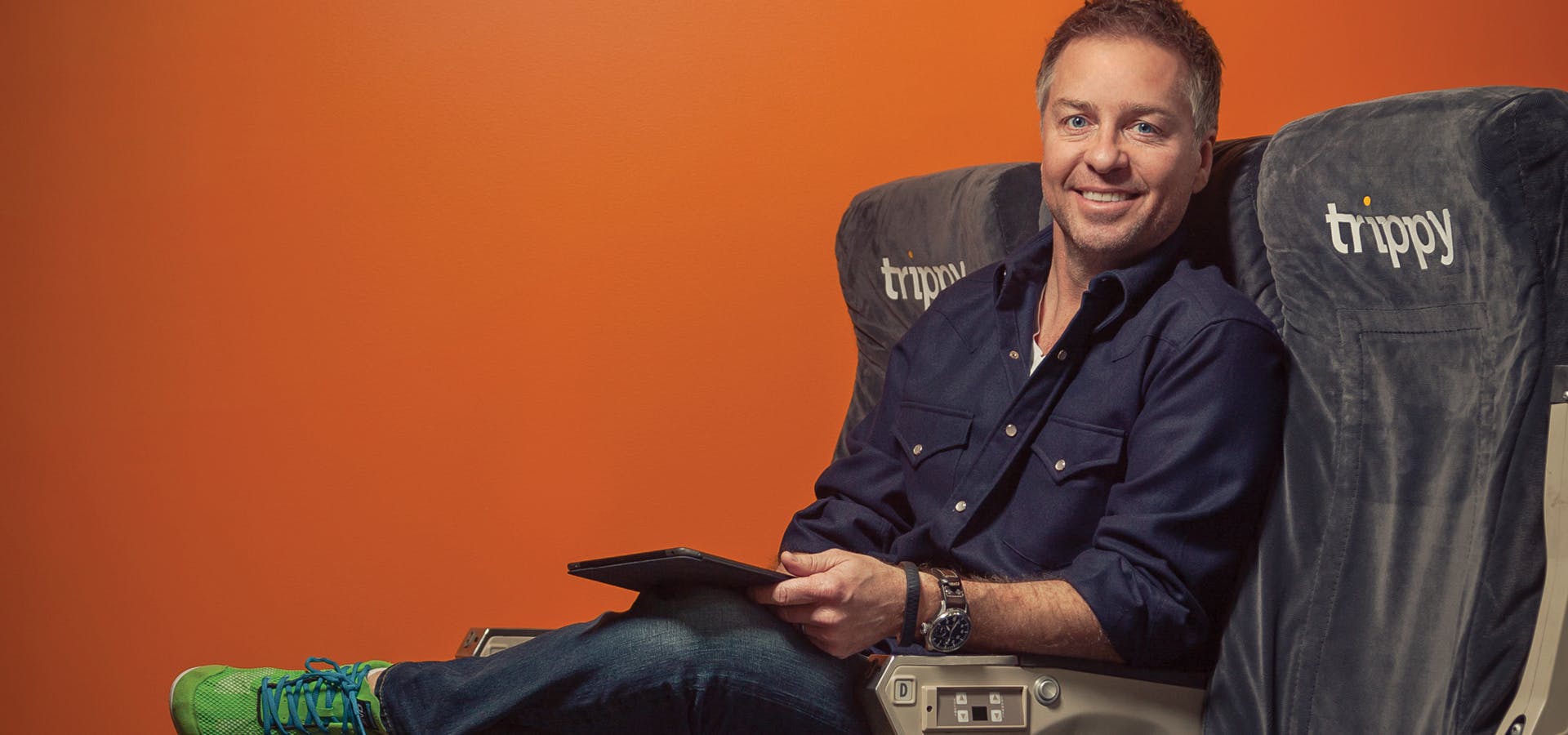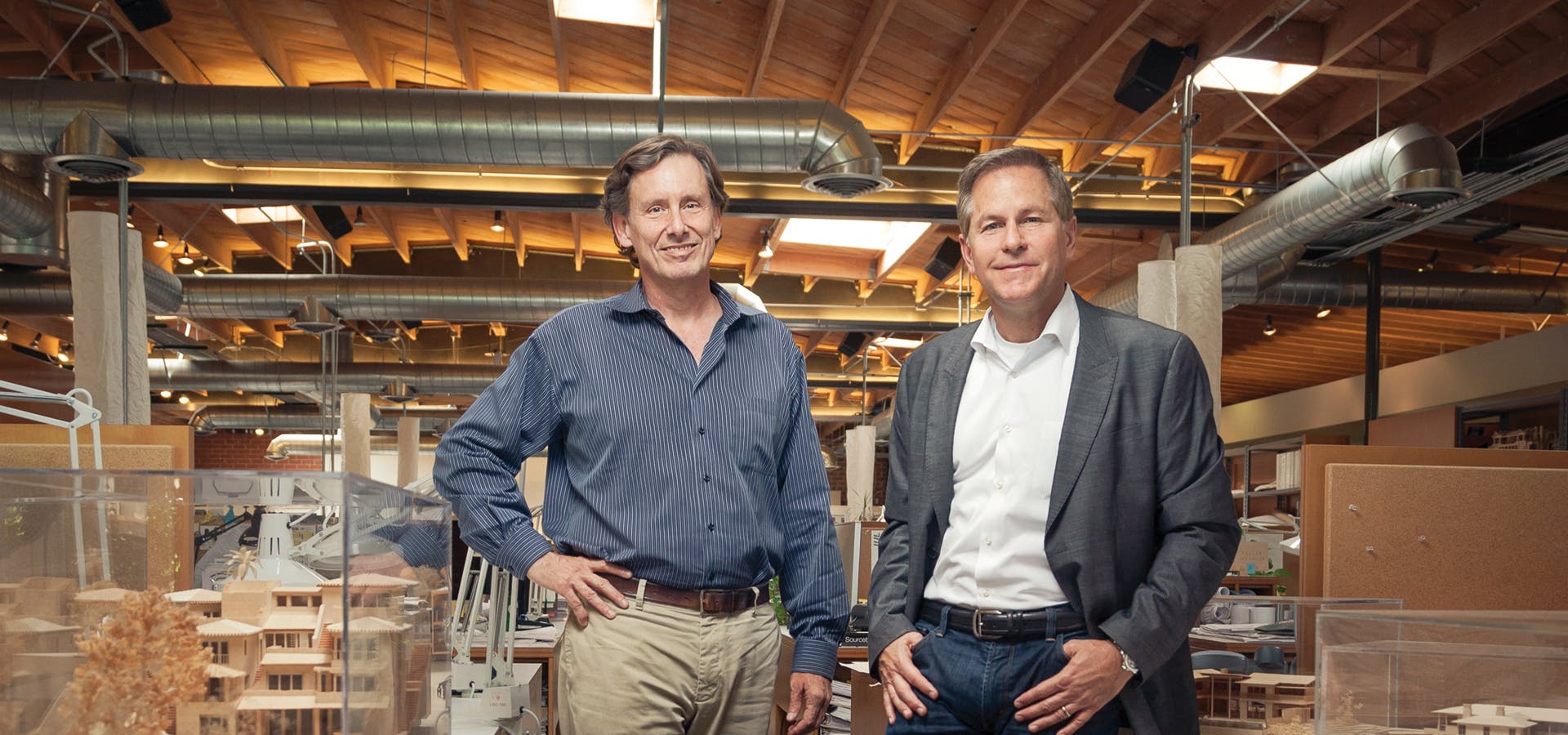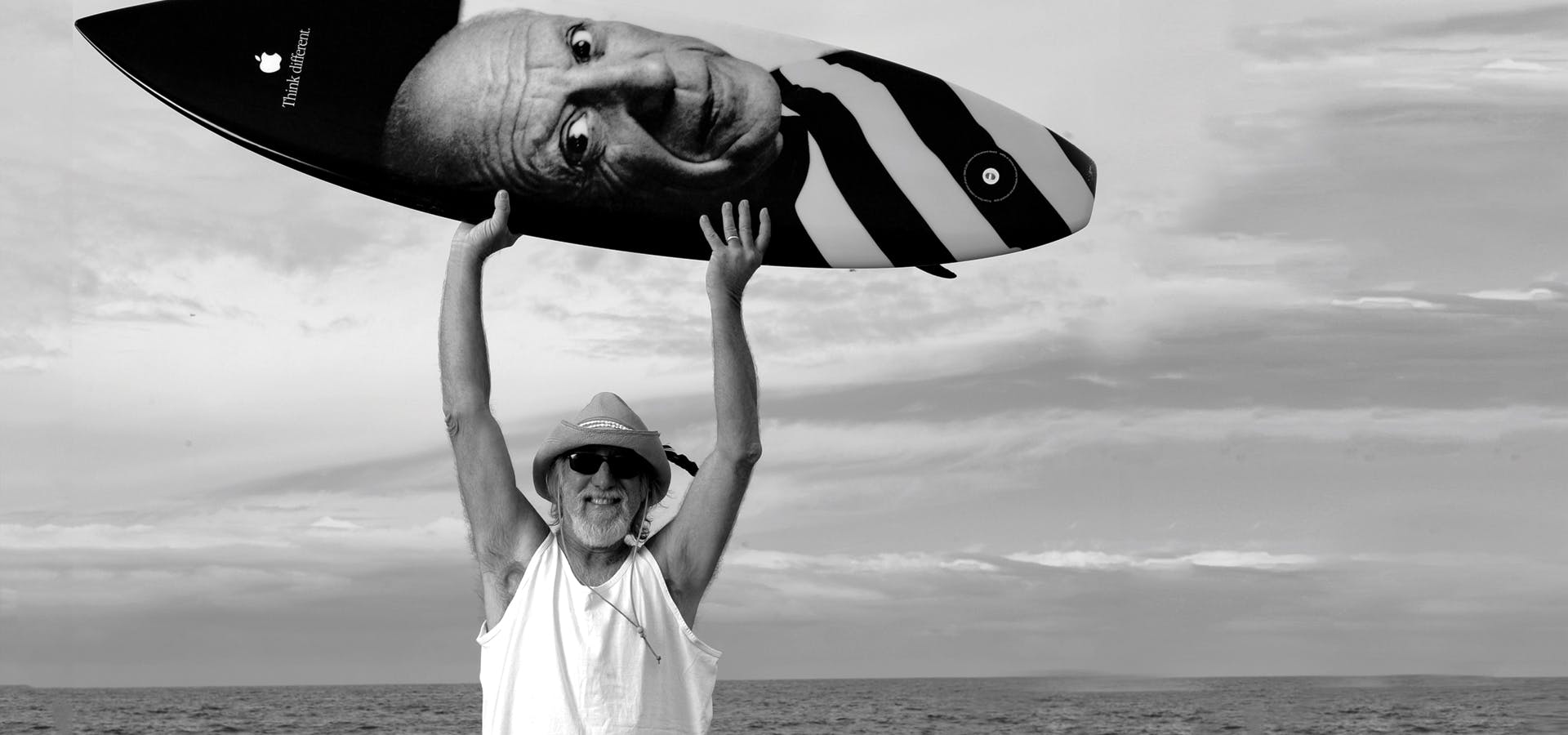“I’m watching all this internet stuff blow up, and I’m like, ‘I’ve got to get out of here,’” says J.R., who had studied entrepreneurship as an undergrad at USC.
After speaking at a conference in Germany, J.R. was approached by two 20-something computer science students—Tilman Reissfelder and Thorsten Kalkbrenner—from the Karlsruhe Institute of Technology, one of Germany’s largest research institutions. They had built a basic travel website called vtourist and were eager to find a way to get their fledgling business off the ground.
“I was looking for any opportunity to get out of law, and travel was something I was always passionate about,” says J.R. “And the Germans were looking for a way to get over to the States, so it was a perfect match.”
J.R. quit his job at the firm, struck an agreement with his new partners and moved the company, now called VirtualTourist, into his great-grandmother’s beach cottage on 33rd Street in Manhattan Beach. He raised $263,000 from friends and family and convinced former classmates and colleagues to leave their steady jobs to join his team of would-be entrepreneurs.
He scheduled meetings with venture capital firms for April 2000, at which point he calculated the site’s user-generated travel content would be attracting more than enough traffic to compete with established brands like Lonely Planet and justify the kind of massive investment that had become a Silicon Valley standard.
He never got that far. The dot-com bubble burst in March. His meetings were cancelled, and without further funding, he was forced to lay off most of his staff.
“That was the hardest part,” says J.R., “people believing in you and you letting them down.”
With no money, mounting credit card debt and “two German little brothers” to take care of, J.R. entered what he calls “cockroach mode.” His mother dropped off wholesale portions of bagel dogs every week, and unemployment checks and Coffee Bean coupons helped fuel an almost constant state of work on the website.
“We were hiding out in the dark just trying to stay alive,” says J.R. “Logical people would have left and done something else, but we were young. We were stupid. We were stubborn. And we believed we had something. That’s why young people start these things and succeed. If you were older and smarter, you’d realize that you’re going to fail.”
“We’re in one of these amazing times in history when a couple of kids can turn an idea into a multimillion dollar company. Why would I go sit on a beach somewhere? I’ve got a beautiful beach in my backyard, so I’m still in the game, trying to create cool stuff.”
Traffic grew, and when Google introduced AdSense in 2003, revenue grew as well. When J.R. started taking meetings with potential buyers, no one had heard of the little startup from the South Bay, as they had operated independently of Silicon Valley’s tech infrastructure from the very beginning.
In 2008, J.R. sold VirtualTourist and OneTime, a price comparison and booking service for travelers, to Expedia—for $85 million, according to VentureBeat.

Tilman took his money and, according to his LinkedIn profile, “fell off the edge of the globe” in the Philippines. Thorsten stayed in Los Angeles and currently serves as CEO of Stylem Media, a mobile app development shop. J.R. moved out of his great-grandmother’s house and bought his own place in Manhattan Beach, though he keeps a laminated Coffee Bean coupon on his desk as a reminder of the lean years, even as he tries to disrupt the section of the travel industry he helped create.
J.R. isn’t alone anymore. According to Startup Genome, Los Angeles has grown into the world’s third largest startup ecosystem, behind only Silicon Valley and Tel Aviv. While about 36% of those startups are headquartered in Silicon Beach, the three-mile stretch from Santa Monica to Playa Vista, a recent LA Startup Industry Report for 2013 compiled by BeGreat.co identifies a growing portion (about 9%) operating in the South Bay.
At least 15 of them are headquartered at the South Bay Entrepreneurial Center (SBEC) on Sartori Avenue in Old Torrance, the South Bay’s first and, so far, only business incubator. Founded in 2011 by a small group of local business leaders with a $100,000 grant from the city of Torrance, the nonprofit SBEC “assists startups and emerging growth companies by providing education, resources, physical plant, networking, coaching, mentoring, funding avenues and a supportive and collaborative environment—to nurture and grow ideas into reality.”
Unlike most incubator and accelerator programs, the SBEC does not take equity in its member companies or require founders to complete a prescribed course of study. For a flat fee of $300 per month, accepted companies gain access to membership benefits for “as long as they can benefit from the services.”
“We support the South Bay’s ideation, incubation and execution process with a powerful, accessible group of mentors,” says SBEC board member Dave Behar, a serial entrepreneur who currently serves as founder, CEO and “Chief Executive Athlete” of the ION Network, a locally focused sports channel network.
Dave says that early-stage startups are key job growth drivers, helping displaced employees get back to work quicker. “The SBEC is delivering the essential startup tools and knowledge transfer for entrepreneur success and sustainability.”
Beau Bratton, 36, a Redondo Beach resident and first-time entrepreneur whose startup, Speed-to-Contact, offers “custom telephony solutions” to help businesses contact their internet leads, works out of the SBEC offices a few times per week.
“[The SBEC] connected me with mentors and other entrepreneurs who helped point me in the right direction,” says Beau. “We’ve recently gotten some very large clients on board, so we need to hire some people.”
That’s exactly what Fran Fulton, economic development manager for the city of Torrance and a cofounder of the SBEC, likes to hear. She sees the center’s potential to create jobs, raise tax revenue and “reinvent the community” through spreading the word that Torrance is “a business-friendly city.”
If, that is, it can keep its own doors open. Fran says the SBEC is struggling to stay solvent even as the demand for its services continues to grow. She has already invited graduate students from the USC School of Policy, Planning & Development to analyze the center’s operations and make recommendations on how to achieve long-term financial sustainability. Their capstone project is scheduled to begin in January.
“We’re looking at fees, grants, corporate sponsorships,” says Fran. “We need to incubate the incubator.”
A few miles north, another South Bay city is looking to startups not only to create jobs but also to help launch a creative business district. Ted Shove is the economic development coordinator for the city of El Segundo, and if you were betting on where the South Bay’s Silicon Valley might be, he would tell you to put your money on Smoky Hollow.
So named for the smoke that once settled there from the nearby Standard Oil refinery, Smoky Hollow is an aging industrial district that Ted sees as a potential hub for emerging companies in search of that perfect combination of affordable, scalable space and a vibrant, creative community.
“Our small businesses would do a little bit better if we had more of a daytime population downtown, and that goes hand-in-hand with filling small vacancies in Smoky Hollow,” says Ted. “When we get a call to help line up a location for folks, whether they’re an established small business or looking for their first space outside of their own garage, we can show them a long-term space with growth potential.”
Ted reaches out to local businesses regularly, and that’s how he found out that Beyond Meat was looking to make a move.
Cofounded by Ethan Brown and Manhattan Beach native Brent Taylor, Beyond Meat develops plant protein products that mimic the taste and texture of animal-based proteins. Their “chicken-free strips” debuted in Whole Foods throughout the United States in March 2013, and TIME named them one of the year’s “Top 10 Exciting Startups” in December.

When the company outgrew its office on Sepulveda, Ted helped them find a 4,000-square-foot former factory on Main Street in downtown, a few blocks west of Smoky Hollow, and guided them through the red tape—the zoning, the parking, the permitting restrictions—all to make sure their business (and their jobs) remained in El Segundo.
“The city was super accommodating,” says Brent. “We chose El Segundo because it’s one of the most business-friendly cities in California. They’re very proactive in helping you navigate some of the hurdles you need to overcome to do business here. Everyone’s really stoked about the revitalization of the area. It’s a nice community, very friendly. We can grab a coffee or a beer down the street. We managed to keep everyone happy.”
Mayor Bill Fisher championed the move as both a sign and a triumph of the city’s ongoing transformation.
“El Segundo is pleased to be the home of many of California’s most exciting startup companies,” says Mayor Fisher. “Beyond Meat has chosen the Smoky Hollow area of El Segundo because it is an epicenter in which innovation, creativity and prosperity thrive.”
With “an open office layout, new test kitchen and a family-style dining area,” Ethan and Brent believe they can create the kind of company culture that breeds success.
“We see this move to Smoky Hollow as an opportunity to join a community of vibrant companies that are changing the world, and to enhance the day-to-day lives of our employees by providing a creative, open-space environment to collaborate,” said Ethan in a press release announcing their relocation. “At Beyond Meat, we try very hard to create a work environment that fosters acceptance of new ideas and teamwork internally while staying keenly in tune with our external audiences. The new office’s location and open atmosphere supports both goals. We are confident this move to Smoky Hollow will positively impact our efforts to reduce the world’s dependency on animal protein.”
As Torrance and El Segundo transform the industrial infrastructure of the South Bay’s past into the creative clusters of its future, the region’s prosperity will be less tethered to the companies (Chevron, Grumman, Honda) that have bolstered its economy for decades. Open floor plans, exposed brick and natural light have become startup staples, and local leaders hope to parlay that unused architecture into new markets in entertainment, technology and advertising that can supplement existing ones in the aerospace, energy and automotive sectors—creating a more balanced economy that can weather the rise and fall of any single industry.
“It’s about … improving an area that has become somewhat obsolete,” City Manager Greg Carpenter told the Los Angeles Times in 2012. “There is a great deal of interest all of a sudden in those types of buildings, and we want to take advantage of it. We always want aerospace to be important, but we want to expand the job base.”
Investors have begun to take notice. Rick Smith, a Manhattan Beach resident and cofounder of CrossCut Ventures—a $21 million seed stage venture capital firm headquartered in Venice—sees “a lot more opportunities in the South Bay now than we’ve ever seen before.”
Rick works from the El Segundo offices of Intelligent Beauty, an e-commerce conglomerate cofounded by CrossCut venture partner Adam Goldenberg that PandoDaily called “shockingly large and profitable”—especially considering that so few people have even heard of it—and “Southern California’s best hope at a multi-billion dollar exit.”
JustFab leads the Intelligent Beauty portfolio as a subscription fashion service that “combine[s] the convenience of online shopping with the luxury of having a personal shopper,” and Adam’s e-commerce expertise has already drawn like-minded companies to the South Bay.
After CrossCut led a $3.1 million Series A round for Club W, a subscription-based wine-of-the-month club founded in Denver, JustFab incubated the company at its headquarters in El Segundo, where it has since found its own independent location, creating what Rick calls “an ecosystem of expertise.”
“I’m excited about what’s happening in Los Angeles in general, but for the first time in my 15 years of doing this, some of it is happening in the South Bay,” says Rick. “Clustering really does work. From a lifestyle perspective, it’s hard to beat the South Bay, so you create an environment where entrepreneurs wanna be, you get a few startups there, and it helps you pick up momentum. These places become hubs. It makes it easier to get VCs to come down and see three or four [startups] in the South Bay at a time rather than just one.”

All of which bodes well for J.R. Johnson. He’s back in the startup game with Trippy, an online community platform for travel-related queries.
“We have a community of enthusiasts and experts,” he says. “When you ask a question, you get a personal answer from someone who cares about travel and appreciates how it elevates our understanding of the world.”
The travel content space—much like the LA startup scene—has gotten rather crowded since J.R. left in 2008. In fact, he’s not even the only entrepreneur in his own house.
J.R.’s wife, Susan Johnson, left her position at Facebook to take over women.com, another online platform that’s targeting a different community with a similar strategy: questions.
“I want to create a better experience for women online,” says Susan. “There’s nothing out there that’s as inviting and authentic and open as I need it to be, that gives me the sort of answers and advice that I would get from a great girlfriend, or my mother, or a psychologist even. Women have stories to tell and opinions to share, and at women.com, I want to be able to release all of that knowledge to help other women.”
Whether J.R. and Susan can replicate the success of VirtualTourist or join Beyond Meat and Intelligent Beauty in the upper echelon of local entrepreneurs remains to be seen. But one thing, at least, is certain: Their triumph or failure will happen here—in the South Bay.
“People always ask me, ‘Why don’t you move to the [Silicon] Valley?’” says J.R. “And I tell them: I don’t have to.”
A fresh crop of web-savvy impresarios in LA’s South Bay dream of becoming the next success story.
J.R. Johnson was a 28-year-old lawyer working for a Los Angeles-based firm when he found himself on the outside looking in. It was 1999, the height of the dot-com boom—the year when 308 tech companies went public.
Investors were throwing money at internet stocks with such exuberance that more than 100 of them doubled in value on their first day of trading. The majority of these companies had never even shown a profit, but no one seemed to care. Their success had rewritten the record books and the rules.
 “I’m watching all this internet stuff blow up, and I’m like, ‘I’ve got to get out of here,’” says J.R., who had studied entrepreneurship as an undergrad at USC.
“I’m watching all this internet stuff blow up, and I’m like, ‘I’ve got to get out of here,’” says J.R., who had studied entrepreneurship as an undergrad at USC.
After speaking at a conference in Germany, J.R. was approached by two 20-something computer science students—Tilman Reissfelder and Thorsten Kalkbrenner—from the Karlsruhe Institute of Technology, one of Germany’s largest research institutions. They had built a basic travel website called vtourist and were eager to find a way to get their fledgling business off the ground.
“I was looking for any opportunity to get out of law, and travel was something I was always passionate about,” says J.R. “And the Germans were looking for a way to get over to the States, so it was a perfect match.”
J.R. quit his job at the firm, struck an agreement with his new partners and moved the company, now called VirtualTourist, into his great-grandmother’s beach cottage on 33rd Street in Manhattan Beach. He raised $263,000 from friends and family and convinced former classmates and colleagues to leave their steady jobs to join his team of would-be entrepreneurs.
He scheduled meetings with venture capital firms for April 2000, at which point he calculated the site’s user-generated travel content would be attracting more than enough traffic to compete with established brands like Lonely Planet and justify the kind of massive investment that had become a Silicon Valley standard.
He never got that far. The dot-com bubble burst in March. His meetings were cancelled, and without further funding, he was forced to lay off most of his staff.
“That was the hardest part—” says J.R., “people believing in you and you letting them down.”
With no money, mounting credit card debt and “two German little brothers” to take care of, J.R. entered what he calls “cockroach mode.” His mother dropped off wholesale portions of bagel dogs every week, and unemployment checks and Coffee Bean coupons helped fuel an almost constant state of work on the website.
“We were hiding out in the dark just trying to stay alive,” says J.R. “Logical people would have left and done something else, but we were young. We were stupid. We were stubborn. And we believed we had something. That’s why young people start these things and succeed. If you were older and smarter, you’d realize that you’re going to fail.”
“We’re in one of these amazing times in history when a couple of kids can turn an idea into a multimillion dollar company. So why would I go sit on a beach somewhere? I’ve got a beautiful beach in my backyard, so I’m still in the game, trying to create cool stuff.”
 Traffic grew, and when Google introduced AdSense in 2003, revenue grew as well. When J.R. started taking meetings with potential buyers, no one had heard of the little startup from the South Bay, as they had operated independently of Silicon Valley’s tech infrastructure from the very beginning.
Traffic grew, and when Google introduced AdSense in 2003, revenue grew as well. When J.R. started taking meetings with potential buyers, no one had heard of the little startup from the South Bay, as they had operated independently of Silicon Valley’s tech infrastructure from the very beginning.
In 2008 J.R. sold VirtualTourist and OneTime, a price comparison and booking service for travelers, to Expedia—for $85 million, according to VentureBeat.
Tilman took his money and, according to his LinkedIn profile, “fell off the edge of the globe” in the Philippines. Thorsten stayed in Los Angeles and currently serves as CEO of Stylem Media, a mobile app development shop. J.R. moved out of his great-grandmother’s house and bought his own place in Manhattan Beach, though he keeps a laminated Coffee Bean coupon on his desk as a reminder of the lean years, even as he tries to disrupt the section of the travel industry he helped create.
“We’re in one of these amazing times in history when a couple of kids can turn an idea into a multi-million dollar company,” says J.R. “So why would I go sit on a beach somewhere? I’ve got a beautiful beach in my backyard, so I’m still in the game, trying to create cool stuff.”
J.R. isn’t alone anymore. According to Startup Genome, Los Angeles has grown into the world’s third largest startup ecosystem, behind only Silicon Valley and Tel Aviv. While about 36% of those startups are headquartered in Silicon Beach, the three-mile stretch from Santa Monica to Playa Vista, a recent LA Startup Industry Report for 2013 compiled by BeGreat.co identifies a growing portion (about 9%) operating in the South Bay.
At least 15 of them are headquartered at the South Bay Entrepreneurial Center (SBEC) on Sartori Avenue in Old Torrance, the South Bay’s first and, so far, only business incubator. Founded in 2011 by a small group of local business leaders with a $100,000 grant from the city of Torrance, the nonprofit SBEC “assists startups and emerging growth companies by providing education, resources, physical plant, networking, coaching, mentoring, funding avenues and a supportive and collaborative environment—to nurture and grow ideas into reality.”
Unlike most incubator and accelerator programs, the SBEC does not take equity in its member companies or require founders to complete a prescribed course of study. For a flat fee of $300 per month, accepted companies gain access to membership benefits for “as long as they can benefit from the services.”
“We support the South Bay’s ideation, incubation and execution process with a powerful, accessible group of mentors,” says SBEC board member Dave Behar, a serial entrepreneur who currently serves as founder, CEO and “Chief Executive Athlete” of the ION Network, a locally focused sports channel network.
Dave says that early-stage startups are key job growth drivers, helping displaced employees get back to work quicker. “The SBEC is delivering the essential startup tools and knowledge transfer for entrepreneur success and sustainability.”
Beau Bratton, 36, a Redondo Beach resident and first-time entrepreneur whose startup, Speed-to-Contact, offers “custom telephony solutions” to help businesses contact their internet leads, works out of the SBEC offices a few times per week.
“Smoky Hollow is an aging industrial district that Ted Shove sees as a potential hub for emerging companies in search of that perfect combination of affordable, scalable space and a vibrant, creative community.”
“[The SBEC] connected me with mentors and other entrepreneurs who helped point me in the right direction,” says Beau. “We’ve recently gotten some very large clients on board, so we need to hire some people.”
That’s exactly what Fran Fulton, economic development manager for the city of Torrance and a cofounder of the SBEC, likes to hear. She sees the center’s potential to create jobs, raise tax revenue and “reinvent the community” through spreading the word that Torrance is “a business-friendly city.”
If, that is, it can keep its own doors open. Fran says the SBEC is struggling to stay solvent even as the demand for its services continues to grow. She has already invited graduate students from the USC School of Policy, Planning & Development to analyze the center’s operations and make recommendations on how to achieve long-term financial sustainability. Their capstone project is scheduled to begin in January.
“We’re looking at fees, grants, corporate sponsorships,” says Fran. “We need to incubate the incubator.”
A few miles north, another South Bay city is looking to startups not only to create jobs but also to help launch a creative business district. Ted Shove is the economic development coordinator for the city of El Segundo, and if you were betting on where the South Bay’s Silicon Valley might be, he would tell you to put your money on Smoky Hollow.
So named for the smoke that once settled there from the nearby Standard Oil refinery, Smoky Hollow is an aging industrial district that Ted sees as a potential hub for emerging companies in search of that perfect combination of affordable, scalable space and a vibrant, creative community.
“Our small businesses would do a little bit better if we had more of a daytime population downtown, and that goes hand-in-hand with filling small vacancies in Smoky Hollow,” says Ted. “When we get a call to help line up a location for folks, whether they’re an established small business or looking for their first space outside of their own garage, we can show them a long-term space with growth potential.”
Ted reaches out to local businesses regularly, and that’s how he found out that Beyond Meat was looking to make a move.
Cofounded by Ethan Brown and Manhattan Beach native Brent Taylor, Beyond Meat develops plant protein products that mimic the taste and texture of animal-based proteins. Their “chicken-free strips” debuted in Whole Foods throughout the United States in March 2013, and TIME named them one of the year’s “Top 10 Exciting Startups” in December.
When the company outgrew its office on Sepulveda, Ted helped them find a 4,000-square-foot former factory on Main Street in downtown, a few blocks west of Smoky Hollow, and guided them through the red tape—the zoning, the parking, the permitting restrictions—all to make sure their business (and their jobs) remained in El Segundo.
“The city was super accommodating,” says Brent. “We chose El Segundo because it’s one of the most business-friendly cities in California. They’re very proactive in helping you navigate some of the hurdles you need to overcome to do business here. Everyone’s really stoked about the revitalization of the area. It’s a nice community, very friendly. We can grab a coffee or a beer down the street. We managed to keep everyone happy.”
View Gallery
Mayor Bill Fisher championed the move as both a sign and a triumph of the city’s ongoing transformation.
“El Segundo is pleased to be the home of many of California’s most exciting startup companies,” says Mayor Fisher. “Beyond Meat has chosen the Smoky Hollow area of El Segundo because it is an epicenter in which innovation, creativity and prosperity thrive.”
With “an open office layout, new test kitchen and a family-style dining area,” Ethan and Brent believe they can create the kind of company culture that breeds success.
“We see this move to Smoky Hollow as an opportunity to join a community of vibrant companies that are changing the world, and to enhance the day-to-day lives of our employees by providing a creative, open-space environment to collaborate,” said Ethan in a January 22 press release announcing their relocation. “At Beyond Meat, we try very hard to create a work environment that fosters acceptance of new ideas and teamwork internally while staying keenly in tune with our external audiences. The new office’s location and open atmosphere supports both goals. We are confident this move to Smoky Hollow will positively impact our efforts to reduce the world’s dependency on animal protein.”
As Torrance and El Segundo transform the industrial infrastructure of the South Bay’s past into the creative clusters of its future, the region’s prosperity will be less tethered to the companies (Chevron, Grumman, Honda) that have bolstered its economy for decades. Open floor plans, exposed brick and natural light have become startup staples, and local leaders hope to parlay that unused architecture into new markets in entertainment, technology and advertising that can supplement existing ones in the aerospace, energy and automotive sectors—creating a more balanced economy that can weather the rise and fall of any single industry.
“It’s about … improving an area that has become somewhat obsolete,” City Manager Greg Carpenter told the Los Angeles Times in 2012. “There is a great deal of interest all of a sudden in those types of buildings, and we want to take advantage of it. We always want aerospace to be important, but we want to expand the job base.”
Investors have begun to take notice. Rick Smith, a Manhattan Beach resident and cofounder of CrossCut Ventures—a $21 million seed stage venture capital firm headquartered in Venice—sees “a lot more opportunities in the South Bay now than we’ve ever seen before.”
Rick works from the El Segundo offices of Intelligent Beauty, an e-commerce conglomerate cofounded by CrossCut venture partner Adam Goldenberg that PandoDaily called “shockingly large and profitable”—especially considering that so few people have even heard of it—and “Southern California’s best hope at a multi-billion dollar exit.”
JustFab leads the Intelligent Beauty portfolio as a subscription fashion service that “combine[s] the convenience of online shopping with the luxury of having a personal shopper,” and Adam’s e-commerce expertise has already drawn like-minded companies to the South Bay.
“Clustering really does work. From a lifestyle perspective, it’s hard to beat the South Bay, so you create an environment where entrepreneurs wanna be, you get a few startups there, and it helps you pick up momentum. These places become hubs.”
After CrossCut led a $3.1 million Series A round for Club W, a subscription-based wine-of-the-month club founded in Denver, JustFab incubated the company at its headquarters in El Segundo, where it has since found its own independent location, creating what Rick calls “an ecosystem of expertise.”
“I’m excited about what’s happening in Los Angeles in general, but for the first time in my 15 years of doing this, some of it is happening in the South Bay,” says Rick. “Clustering really does work. From a lifestyle perspective, it’s hard to beat the South Bay, so you create an environment where entrepreneurs wanna be, you get a few startups there, and it helps you pick up momentum. These places become hubs. It makes it easier to get VCs to come down and see three or four [startups] in the South Bay at a time rather than just one.”
All of which bodes well for J.R. Johnson. He’s back in the startup game with Trippy, an online community platform for travel-related queries.
“We have a community of enthusiasts and experts,” he says. “When you ask a question, you get a personal answer from someone who cares about travel and appreciates how it elevates our understanding of the world.”
The travel content space—much like the LA startup scene—has gotten rather crowded since J.R. left in 2008. In fact, he’s not even the only entrepreneur in his own house.
 J.R.’s wife, Susan Johnson, left her position at Facebook to take over women.com, another online platform—set to launch in March—that’s targeting a different community with a similar strategy: questions.
J.R.’s wife, Susan Johnson, left her position at Facebook to take over women.com, another online platform—set to launch in March—that’s targeting a different community with a similar strategy: questions.
“I want to create a better experience for women online,” says Susan. “There’s nothing out there that’s as inviting and authentic and open as I need it to be, that gives me the sort of answers and advice that I would get from a great girlfriend, or my mother, or a psychologist even. Women have stories to tell and opinions to share, and at women.com, I want to be able to release all of that knowledge to help other women.”
Whether J.R. and Susan can replicate the success of VirtualTourist or join Beyond Meat and Intelligent Beauty in the upper echelon of local entrepreneurs remains to be seen. But one thing, at least, is certain: Their triumph or failure will happen here—in the South Bay.
“People always ask me, ‘Why don’t you move to the [Silicon] Valley?’” says J.R. “And I tell them: I don’t have to.”
[slideshow gallery_id=”2″]










